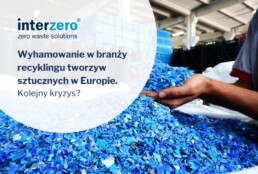The plastics recyclers' organisation, Plastics Recyclers Europe, is sounding the alarm: the plastics recycling industry is on the brink and facing the biggest declines in production and installed capacity in over 20 years. Unless these trends are reversed, the stagnation of the industry will continue, which in turn will jeopardise the EU's climate targets and the future of the circular economy.
Alarming plastic recycling figures in Europe: production down and imports up
The year 2023 was a critical year for most companies dealing with recycling of plastics. The recently published Plastics Recyclers Europe report confirmed what the industry has known for a long time - the current we are facing a sharp decline in demand for European recyclates, with rising energy costs and unrelenting competition from imported plastics. In 2023, the estimated Sector turnover down 12.5% compared to 2022, reaching EUR 9.1 billion. By €0.5bn (or 50%) on an annualised basis investment has also fallen, and the rate of growth in installed capacity decreased from 17% in 2021 to just 6% in 2023.
As a result, European production of recyclates has fallen by an average of 5% and the number of plant closures has risen sharply. As experts predict, this unfavourable trend will continue in 2025 and probably also in the following years. One reason for this is the gradual displacement of locally produced recyclate by imported plastics. Currently, the EU already imports approx. 20% of used virgin and recycled polymers, which tempt customers primarily with a much lower price.
Waste exports and uncontrolled imports of polymers are new trends in the plastics recycling market
Europe's polymer recycling industry also faces rising sourcing costs and increasingly limited access to plastic waste. From 2022 to 2023, their exports increased by as much as 36%, gradually depriving indigenous plants of raw material for production.
Wanting not wanting, the region is slowly backing away from its recycling ambitionsThe trend is towards processing waste outside Europe and then importing the resulting cheap recyclate. Interestingly, imported virgin polymers are also competing on price with European recycled plastics. This is significant a threat to the development of an intra-European closed loop economy and for the achievement of ambitious EU environmental goals.
As Plastics Recyclers Europe warns, cheap imported raw material often does not meet stringent European safety standardsand its massive influx could pose a threat not only to the polymer recycling industry, but also to consumers.
Europe loses leadership position in plastics production
The data shows that Europe's share of global plastics production has fallen by half, i.e. from 28% in 2002 to just 14% in 2022. The local industry is also struggling with a lack of demand for the plastics produced and processed in Europe, leading to a general stagnation along the value chain.
In response to the crisis facing the industry, 18 organisations representing the interests of companies present at different levels of the plastics supply chain are calling for immediate action at political and legislative level. Their demands include: the establishment of a single market for waste and recyclates, the harmonisation of best practices across the EU, the implementation of financial support schemes and the introduction of trade defence measures.
Business representatives include Ton Emans, president of Plastics Recyclers Europe, who says:
We call on EU policy makers to take a swift and decisive policy stance, put in place effective import controls and enforce existing legislation, including restricting imports of materials that do not meet equivalent EU sustainability and safety standards. These measures are crucial for the survival of the plastics recycling industry, which has already invested €5 billion between 2020 and 2023 just to meet mandatory targets.
Read also: European plastics recycling in trouble >>
From the information contained in the report "Plastics Recycling Industry Figures 2023" shows that to meet the requirements of the new Packaging and Packaging Waste Regulation (PPWR), an additional 2 million tonnes of HDPE and PP rigid recycling capacity will be needed by 2030, and an additional 5.7 million tonnes of recycling capacity will be required by 2040.
Sources:
- Crisis in EU Plastic Recycling Demands Immediate Action, https://plastics-recyclers-europe.prezly.com/crisis-in-eu-plastic-recycling-demands-immediate-action
- EU's competitiveness under severe threat: plastics sector at crossroads, https://plastics-recyclers-europe.prezly.com/eus-competitiveness-under-severe-threat-plastics-sector-at-crossroads
- Publications - Plastics Recyclers Europe
